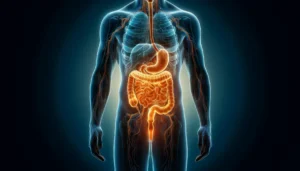The IBS Diet That Can Replace Medication
Irritable Bowel Syndrome (IBS) profoundly affects the lives of millions, with symptoms that can disrupt everyday activities and overall quality of life. Recent research underscores that a specific IBS diet, particularly one low in carbohydrates, may offer more effective relief than traditional medications. In this post, you’ll discover how adopting a low-carbohydrate regimen can be transformative for those battling this stubborn condition.
Understanding IBS and the Importance of Diet
Irritable Bowel Syndrome (IBS) is a prevalent functional gastrointestinal disorder that affects the large intestine, also known as the colon. It manifests through a variety of symptoms including abdominal pain, bloating, diarrhea, and constipation. These symptoms arise due to the complex interplay of intestinal motility, sensitivity, and the nervous system’s regulation of the gut.
The Role of the Large Intestine in IBS
The large intestine plays a crucial role in the absorption of water and salts from food remnants passed from the small intestine. It is also responsible for the formation and transportation of waste. In IBS, several disturbances occur in these functions:
- Altered Motility: In individuals with IBS, the motility, or movement, of the bowel can be irregular. Some experience slowed movement, leading to constipation and bloating, as waste moves too slowly and too much water is absorbed. Others may have accelerated intestinal motility, causing diarrhea, where not enough water is absorbed due to the rapid passage of waste.
- Heightened Sensitivity: Many with IBS have an increased sensitivity to the stretching of the bowel caused by the gas or stool. This heightened gut sensitivity is thought to contribute to the abdominal pain and discomfort associated with the syndrome.
- Dysregulation of the Gut-Brain Axis: The communication between the gut and the brain, known as the gut-brain axis, is vital in maintaining normal bowel functions. IBS can involve miscommunications in this axis, leading to altered bowel habits and pain that seem disproportionate to the physical condition of the gut.
- Inflammatory Response: Although IBS is not traditionally classified as an inflammatory disease, recent studies suggest low-grade inflammation and changes in the gut microbiota may contribute to symptom severity. This inflammation can affect how the bowel functions and exacerbates symptoms.

Why Diet Matters
For many individuals diagnosed with Irritable Bowel Syndrome (IBS), dietary choices are not just about nutrition; they are a key component of symptom management. The connection between what one eats and IBS symptoms is significant, influencing both the frequency and severity of the condition’s manifestations. Here’s a deeper look into why diet holds such importance:
- Direct Interaction with the Gut: Foods consumed directly interact with the mucosal lining of the intestines, where they can cause irritation or provide relief. Certain foods can trigger contractions of the intestinal muscles, leading to the characteristic spasms of IBS.
- Fermentation and Gas Production: High-FODMAP foods (fermentable oligosaccharides, disaccharides, monosaccharides, and polyols) can exacerbate symptoms due to their fermentation in the gut, which produces gas and increases bloating and pain. A low carbohydrate diet reduces these fermentable substrates, thus potentially reducing these symptoms.
- Modification of Gut Flora: What we eat affects the composition of our gut microbiota. A diet high in certain types of carbohydrates, for instance, can promote the growth of specific bacteria that might influence IBS symptoms. Adjusting the diet to include low-carbohydrate, high-fiber foods can help maintain a healthier balance of gut flora, which is crucial for managing inflammation and digestive processes.
- Influence on Gut Motility: The type of food ingested can speed up or slow down the transit of food through the colon. For example, insoluble fiber can accelerate gut motility and help with constipation, whereas soluble fiber can slow down food passage and help with diarrhea.
Although IBS is not traditionally classified as an inflammatory disease, recent studies suggest low-grade inflammation and changes in the gut microbiota may contribute to symptom severity.
Low Carbohydrate Diet vs. Medication: Study Findings
A pivotal aspect of the recent study was the direct comparison between a low-carbohydrate diet and traditional IBS medications. The results were illuminating and underscored the potential of dietary management over pharmacological solutions.
Effectiveness in Symptom Reduction
The study tracked 241 women and 53 men with moderate to severe IBS symptoms, who were divided into three treatment groups. After four weeks, a substantial 71% of participants on the low-carbohydrate diet reported significant reductions in their symptoms, including less bloating, fewer abdominal pain episodes, and improved bowel habits. This was notably higher compared to only 58% improvement in the medication group, highlighting the diet’s superior effectiveness.
After four weeks, a substantial 71% of participants on the low-carbohydrate diet reported significant reductions in their symptoms, including less bloating, fewer abdominal pain episodes, and improved bowel habits. This was notably higher compared to only 58% improvement in the medication group, highlighting the diet’s superior effectiveness.
Participant Feedback
Those in the low-carbohydrate group frequently reported feeling more in control of their symptoms and observed a noticeable improvement in their overall quality of life. Conversely, participants relying on medications often noted fluctuating symptoms and some side effects from the drugs.
Long-Term Benefits
The study also extended its follow-up to six months, during which it became evident that the benefits of the low-carbohydrate diet endured longer than those of medication. Many who continued with the diet maintained better symptom control with fewer relapses, suggesting a sustainable advantage.
Those in the low-carbohydrate group frequently reported feeling more in control of their symptoms and observed a noticeable improvement in their overall quality of life. Conversely, participants relying on medications often noted fluctuating symptoms and some side effects from the drugs.
Medical Insights
According to Dr. Sanna Nybacka, the lead researcher, the diet’s success is likely due to its impact on gut flora and the overall reduction of fermentation in the intestines, which are common triggers for IBS symptoms. This insight points to why the low-carbohydrate diet might be more effective than medications that primarily address symptoms rather than underlying dietary causes.
Implementing the Low Carbohydrate IBS Diet

Embarking on a low carbohydrate diet involves several crucial steps:
- Identify High-Carb Foods: Begin by eliminating or reducing high-carbohydrate foods such as bread, pasta, certain fruits, and sugary snacks.
- Incorporate Suitable Alternatives: Add more proteins like chicken, fish, and beef, along with low-carb vegetables such as leafy greens and cruciferous vegetables.
- Monitor Your Progress: Keep a detailed food diary to observe how different foods affect your symptoms and overall health.
Carbohydrate Targets
The amount of carbohydrates to aim for can vary depending on individual tolerance and the severity of symptoms. Generally, a reduction to 50-100 grams of carbohydrates per day can be a good starting point for many people with IBS. It’s important to monitor symptoms in response to these levels and adjust accordingly. Low-carb diets are not one-size-fits-all, and some may require further adjustments based on personal response.
Generally, a reduction to 50-100 grams of carbohydrates per day can be a good starting point for many people with IBS
Inclusion of Healthy Fats
Including healthy fats in your diet is essential, especially when reducing carbohydrate intake. Fats are crucial for overall health and help maintain satiety, which can prevent overeating. Sources of healthy fats include avocados, olive oil, nuts, and seeds. These fats do not only provide energy; they also facilitate the absorption of fat-soluble vitamins, which are vital for maintaining bodily functions.
Spotlight on Flax Seeds: A Low Carb Superfood

Flax seeds are an excellent addition to a low carbohydrate diet for several reasons. They are high in omega-3 fatty acids, which have anti-inflammatory properties. This can help manage the inflammation sometimes associated with IBS.
Additionally, flax seeds are a great source of both soluble and insoluble fiber. The soluble fiber helps to slow digestion, stabilizing blood sugar levels, and easing diarrhea by absorbing water in the gut. Insoluble fiber helps stimulate the digestive tract to move waste through the colon more efficiently, addressing constipation.
In addition to the foundational elements of a low carbohydrate diet, incorporating flax seeds can be particularly advantageous for individuals managing IBS.
- Rich in Omega-3 Fatty Acids: Flax seeds are a great source of omega-3 fatty acids, which have have strong anti-inflammatory properties. This is crucial for IBS sufferers as inflammation can contribute significantly to gastrointestinal distress and symptoms.
- High in Fiber: Despite being low in carbohydrates, flax seeds are very high in fiber, which can help improve digestive health by promoting regular bowel movements and preventing constipation, a common concern in IBS.
- Versatility in Diet: Flax seeds are incredibly versatile and can be added to many dishes seamlessly, such as sprinkling ground flax over salads, blending into smoothies, or mixing into yogurt. This makes them an easy addition to any meal plan focusing on low carbohydrate intake.
- Anti-Inflammatory Benefits: The anti-inflammatory effects of flax seeds not only help reduce IBS symptoms but also support overall gut health. The lignans found in flax seeds, which are plant compounds that have both antioxidant and estrogen properties, can further aid in reducing inflammation throughout the body.
Incorporating flax seeds into your diet is simple and beneficial. They can be an excellent way to enhance the nutritional profile of your meals without increasing carbohydrate intake, making them ideal for a low carbohydrate IBS diet.
Final Thoughts
The journey through understanding and managing Irritable Bowel Syndrome (IBS) can be challenging. However, the evidence supporting a low carbohydrate IBS diet as an effective approach is compelling. This diet not only helps reduce the frequency and severity of symptoms like bloating and abdominal pain but also offers a pathway to long-term health improvement without the reliance on medications.
Choosing to manage IBS through dietary changes gives individuals control over their symptoms and the quality of their daily lives. It’s a proactive method that aligns with natural body processes and minimizes potential side effects associated with traditional pharmaceutical treatments. In addition, the addition of anti-inflammatory foods like flax seeds can enhance the benefits of the diet. Flax provides essential nutrients and supporting overall digestive health.
Finally, remember that you are not alone in this journey. Many have found significant relief through dietary strategies, and sharing experiences can be incredibly supportive. If you’ve tried the low carbohydrate IBS diet, share your story in the comments below. Let’s build a community of support and exchange tips that have made a difference in managing IBS.
References
- A low FODMAP diet plus traditional dietary advice versus a low-carbohydrate diet versus pharmacological treatment in irritable bowel syndrome. The Lancet
- Irritable Bowel Syndrome (IBS). Johns Hopkins Medicine
A Note to Commercial Bakeries
You can easily produce delicious low carb, keto-friendly products which are clean label, high protein and plant-based!
- Recipes provided on all bulk orders
- Ongoing customer support
- Worldwide shipping
- We are kosher certified


